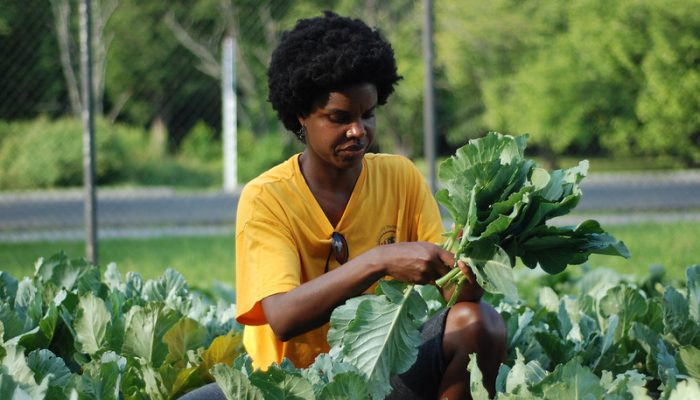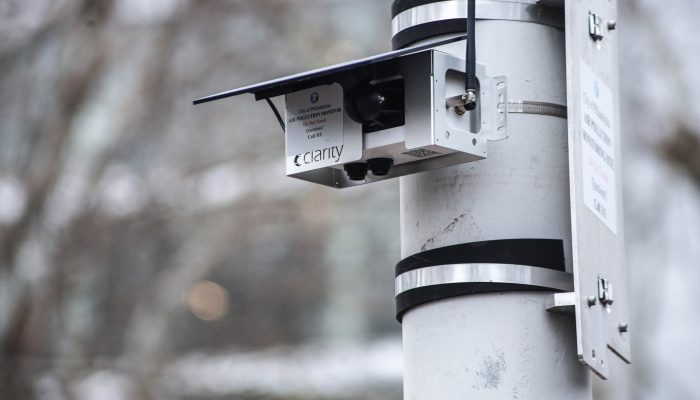All Philadelphians deserve to eat nutritious, culturally relevant, affordable foods. To bolster that, the health department’s Division of Chronic Disease and Injury Prevention (CDIP) administers the Philadelphia Food Justice Initiative (PFJI) – an exciting partnership with the Reinvestment Fund – to support community-driven projects to advance food justice and increase access to healthy food in Philadelphia.
CDIP and the Reinvestment Fund, a nationally-focused Community Development Financial Institution (CDFI) headquartered in Philadelphia, recently awarded more than $549,000 in grants to 14 local organizations to create a more just food system. In total, PFJI has provided nearly $2.4 million in grants to nearly 40 grantees since its launch in 2019.
PFJI provides funding to innovative, community-led projects that strengthen Philadelphia’s food assets and opportunities for individual and collective action to further food justice. The initiative is informed by health justice, the collective movement to heal society and remove barriers to individual and community well-being.
PFJI prioritizes projects led by underserved and underrepresented communities as well as those who have directly experienced health injustice. To date, PFJI has awarded grants to 37 organizations that are owned or led by people of color and 28 organizations that are owned or led by women.
Projects include food distribution, urban agriculture, and cultural education and training. Grant awards in this round range from $18,450 to $50,000 and will support projects with essential personnel, supplies, equipment, and contractual costs.
The projects selected for funding are:
- Assata’s House is addressing food justice and women’s health disparities by creating a network of care for Black women, caregivers, and families. They will distribute fresh food boxes and prepared meals; host workshops led by healers, wellness advocates, and community leaders; and pilot a Community Food Fund to support future meal distribution and food access initiatives, among other efforts.
- Crossroads Women’s Center will expand their Crossroads Kitchen where they involve low-income mothers and grandmothers, mainly of color, in growing fresh vegetables; cooking; and sharing stories, recipes, information, and cultures with each other and the public. They also plan on using stories from community members to advocate for Child Tax Credits and other anti-poverty and anti-hunger efforts.
- Dirtbaby Farm will expand the Giftbaby Postpartum Meal Program, which provides 18 weeks of free, warm meals to Philadelphia mothers and caregivers who have recently given birth. These postpartum meals are made from Dirtbaby Farm’s produce and delivered to families throughout Philadelphia, with families of color as the priority meal recipients.
- Fair Amount Food Forest will use these grant funds to acquire and utilize quality refrigeration equipment, which will allow them to store the produce grown at their garden longer, open a new farmers’ market, and fabricate and install a seed library. This work is done in association with the Brothers of Strawberry Mansion, a food pantry that will also utilize the refrigeration equipment to expand their food access work.
- Get Fresh Daily (GFD) will promote well-being and healthy living through their Freedom Greens and Gardens initiative including a Black Farmers Markets program, nutrition education workshops and future community programming. Through this grant, GFD can further their goal to bridge the gap in health disparities in West Philadelphia by championing food equity and creating a culture of health and community connection.
- Glover Gardens will install 35 elevated garden beds designed for elders and individuals with mobility challenges. This project will also distribute a Grower’s Guide and tool kits of essential gardening tools to reduce barriers of entry for new growers. Glover Gardens aims to create an inclusive, resilient, and self-sufficient community where individuals can reconnect with the land, grow their own food, and strengthen social ties.
- Karen Community Association of Philadelphia will expand their community garden initiatives and develop a CSA program to improve community members’ access to fresh, culturally important produce. They will also expand cultural and educational programs around farming and preserving indigenous Karen foodways.
- Norris Square Neighborhood Project will expand its Raíces de Cambio program where garden apprentices are actively engaged in the food system, from seed to plate. These garden apprentices run the Norris Square Farm Stand, providing fresh produce to their communities and helping to provide daily access to nutritious meals for youth in the neighborhood.
- Stacey Woodson, LLC will foster a love for healthy eating, environmental responsibility, and community engagement from an early age with their Seeds to Sprouts program, which focuses on empowering young minds through hands-on learning experiences centered around container gardening. This program helps develop vital skills such as responsibility, teamwork, and an understanding of the natural world for young minds, in collaboration with preschools and other educational institutions.
- Star Apple Nursery will expand the nursery’s plant offerings and educational programming with a focus on two main themes: climate resiliency and accessible cooking. They will also cultivate hard to find Caribbean and Southeast Asian heritage crops, improving access for local growers and communities.
- The Fridge on 52nd will increase the availability of fresh, nutritious groceries and prepared meals by stocking their community fridge in West Philly in order to meet the growing demand from community members. They plan to expand into programming centered around food justice, nutrition education, and community building. They will also provide stipends to volunteers who have been supporting this food justice effort for years.
- The Neighborhood Land Power Project will engage residents in workshops, food distributions, and organizing efforts. Their focus is on food production and distribution, leadership development, advocacy for land security, cultivating a strong community base capable of securing land, and advocating for policies that prioritize public good over private profit.
- Tubman Guevara Brigade is a group of neighbors who have come together to start a community garden at 58th St. and Baltimore Ave. This grant will support them in growing food with and for their neighbors by building the foundational structures they need such as garden beds, a rain barrel catchment system, and a composting system.
- Workers Revolutionary Collective will pilot a project that designs, tests, and develops a Community Supported Supply Chain cooperative. This is in association with their previous project “Eat in Peace,” a program focused on the advancement of equitable good food access by organizing community-driven food distribution programs.




